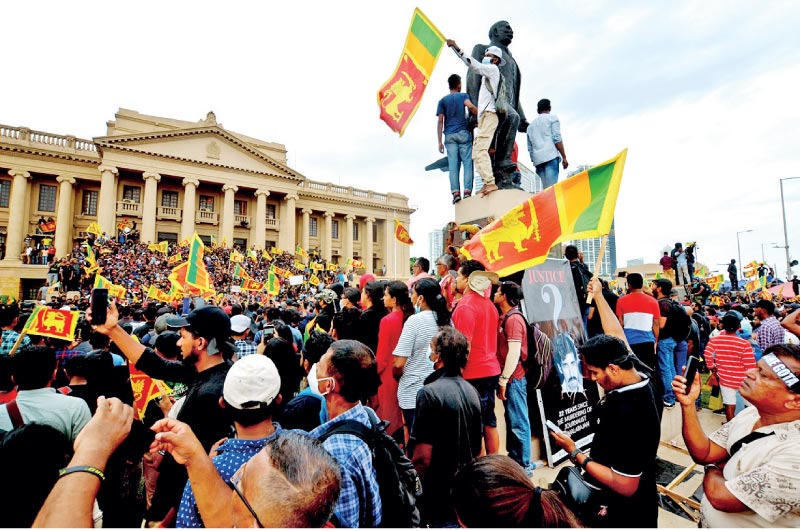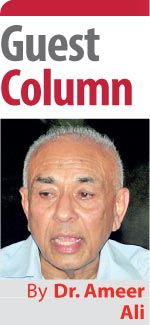Sunday Feb 15, 2026
Sunday Feb 15, 2026
Monday, 13 May 2024 00:00 - - {{hitsCtrl.values.hits}}

But the protestors did not have any clue about the alternative system that they were longing for – Pic by Shehan Gunasekara
 Aragalaya Effect
Aragalaya Effect
Apart from the forced resignation of two Rajapaksas, one a President and the other Prime Minister, a potentially epoch-breaking effect of the 2022 Aragalaya was the uncompromising message it sent to Sri Lankan voters that the multiple crises engulfing the nation and bankrupted the national treasury could not be solved by patchwork measures, but only through a radical overthrow of the socio-political paradigm within which Governments were chosen and the economy managed.
That shattering message was encapsulated in the slogan, “system change”, accompanied by another, “No 225”, which expressed the rebels’ no confidence on the current legislature to bring about that change. But the protestors did not have any clue about the alternative system that they were longing for. Instead, they simply threw the gauntlet at the political parties in the field to take up that challenge. Only the National People’s Power (NPP) under Anura Kumara Dissanayake (AKD) rose to the occasion, accepted that challenge and called for a social revolution to get rid of the political culture that had dominated governance since independence.
While the old guards of the ruling system understood the Aragalaya slogans they were not prepared to surrender and run away without a fight. Their immediate response was to elevate Ranil Wickremesinghe (RW), from being a backbencher and solitary representative of his UNP, to the position of President, and approve his call to invite the IMF to help rebuilding the shattered economy. RW is an experienced old guard schooled in the politics of his grand uncle JR, and IMF is a watchdog of an economic and financial model that rules open economies into which JR dragged Sri Lanka in 1978. Thus, the counter message from the old guards was clear. No system change, but continuation of the same with smoothening its rough edges. All political parties except NPP seem to have fallen in line with this stand.
With IMF as the economic salvager and the existing socio-political paradigm its guardian, the UNP-LPP-SJB-SLFP conglomeration is desperately trying to find a common candidate to challenge AKD to make the Presidential confrontation a binary choice between system retention and system change. To that extent Aragalaya has succeeded.
IMF Effect
No doubt IMF has brought a semblance of economic stability since it stepped in. Low in inflation around 1.5%, appreciating rupee against the dollar and currencies of trading partners, and increase in foreign reserves around $ 5 billion could be cited as evidence of this stability. RW is expecting this year’s growth to reach at least 3%. But they were achieved at the expense of severe belt tightening on the part of a majority of population and restricted imports. Low inflation and appreciating dollar haven’t reduced retail prices. Even then, there are still two major hurdles to cross: foreign debt restructuring and a persisting trade deficit. The ongoing negotiations on debt restructuring involve only $ 27 billion of the total $ 58 billion owing to bilateral and commercial creditors. RW hopes to reduce the debt level to 95% by 2032. It would take many years for Sri Lanka to become a debt free economy under the present system.
Moreover, once negotiations are completed, hopefully on favourable terms, debt servicing should start, and it would be binding on any government that comes to power to honour that commitment. This would mean drain on foreign reserves. But the country’s trade balance continues to be in deficit in spite of restricted imports. Revenue from tourism and foreign remittances are helpful, but insufficient. That means exports have to increase. But the question is what exports and to which markets? Given the economic volatility and gloom prevailing globally at the moment, about which IMF is fully aware of, the chances of earning trade surplus look difficult.
RW’s export-oriented high-tech industrialised economy by 2048 can remain just a dream for the time being. All this would mean that the IMF effect with its bent on cutting social spending to reduce budget deficit will cause even more pain in years to come especially to the lower end of income earners. IMF approved aswesuma is not going to compensate what is being lost through tax and tariff leakages. With this scenario to talk about an economic boom around the corner is presumptuous. RW and his fellow system retentionists would face an uphill task to sell the IMF effect to the voters at large.
Meanwhile, RW is manoeuvring to win preference from all political parties and factions except NPP to be nominated as the common candidate to fight against AKD. The economic recovery to which he is claiming credit is on a slippery slope. But to prove his case prices of a few selected items are being reduced artificially. Normally, prices fall when supply increases while demand remains constant or falls; but in RW’s Sri Lanka they fall as election approaches and voters are expected to fall for that ruse. Recently, when RW visited the hill country, he promised to increase the daily wages of estate workers to Rs. 1,700. Is the Government going to pay this or is he going to force the companies to pay? Is he going to introduce a minimum wage legislation applicable only to the estate sector? All this criticism does not mean that the way is clear and smooth for the system changers to win the race.
Home work for system changers
If the crowds that attended NPP’s May Day rallies in Matara, Colombo, Anuradhapura and Jaffna are an indication then that parry seems to be on a wining wicket. Aragalaya effect has increased NPP’s popularity among a new generation of voters. However, such massive rallies at May Day were seen even before when the leftists in 1950s and 1960s held theirs. Sadly, those crowds did not translate into votes at the ballot box. Therefore, to convert the “3 percent to 51 percent” NPP needs to do more homework. No doubt, the party is committed to system change, vowed to clean up corruption and bring to books those leaders and their apparatchiks who profited through corruption to the detriment of the economy. AKD is promising a new political culture to improve governance and achieve ethnic reconciliation. But the most important challenge is the economy itself. True, like all other parties NPP also has committed to work with IMF with renegotiated terms and conditions. But beyond that the party’s economic strategies to increase local production, provide employment and earn a trade surplus require specific details. Just pronouncing to follow market friendly policies and promote economic partnership with friendly nations are insufficient.
The biggest drawback of the IMF experiment is its disproportionate emphasis on the monetary sector and neglect of the real sector. The belief that a strong monetary sector would pull the whole economy along a growth path is a class-biased fallacy. Added to that is another fallacy based on the Law of One Price, which advocates that free movement of inputs and outputs with flexible exchange rates would lead to full employment and remove economic disparity among nations. Based on these fallacies economic planning even on sectoral levels has become an outdated philosophy. But China proved to be an exception and its rapid development with successive five-year plans is proof. NPP too needs to do some homework along this line.
Sri Lanka’s rural sector is the backbone of its economy. How to encourage adequate resource flows to that sector and increase its share in GDP is a crucial issue. Even regarding industries, focus must be on small and medium enterprises (SMEs), because of their employment potential. Rather than a blanket accommodation to any foreign investment, that investment’s benefit to the nation must be assessed and should be channelled to fill gaps left by SMEs. Market should be free of course, but should that mean freedom for mafias to hijack market forces?
One of the basic requirements for sectoral planning is an up-to-date account of the resources available locally. Does the current Government have this stock of information? If not, it has to be collected by the incoming Government. This means people cannot expect miracles to happen overnight from system change. But all this has to be explained in a language understood by ordinary voters. Behind all economic jargons, theories and models there is common sense as Kenneth Galbraith used to argue.
NPP political leaders must bring that economic sense to the understanding of ordinary voters. It is a challenging task, but it has to be done if the party wants to cross the line through the ballot box. NPP has some serious homework to be done. Its opponents do not have this problem, because they have passed the buck to the IMF.
(The writer is attached to Business School, Murdoch University, W. Australia.)